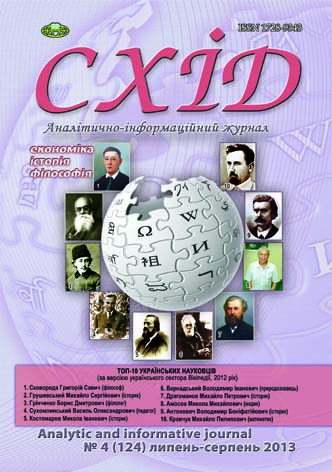Іnstitutional theory of economic planning and criticism using the neo-Austrian school of economics
DOI:
https://doi.org/10.21847/1728-9343.2013.4(124).16953Keywords:
institutionalism, liberalism, neoliberalism, subjectivism, planning, motivation, technocracy, post-industrial societyAbstract
The article is devoted to the modern economic theories of institutionalism and liberalism. Distinct and common methodological approaches of institutional and neoclassical theories in analyzing consumer behavior, management of corporations, the nature of a market economy, and the problems of state regulation are defined.
The article deals with the theory of industrial and post-industrial society, according to which evolution is strongly influenced by the scientific and technological revolution, which alters the nature and structure of the economy, modifies the structure of interest, and causes an increase in prosperity. The main role in this process is played by the "society of technocrats," which is able to predict and plan economic processes.
The author opposes institutional theories of planning, neoliberal claims about limitations, and the subjectivity and spontaneous character of people's knowledge. He agrees with the thesis that the market does not yield to planning and it is not possible to determine in advance the balance of the economic system or to specify its parameters because no one has enough information for this.
The article analyzes the views of institutionalists and neoliberals on the needs of individuals and argues that it is possible to use introspective methods in modeling economic processes. Based on the theories of P. Drucker, J. Galbraith, F. Hayek, L. Mises, the author proposes to develop the concept of planning and motivational development.
References
ЛІТЕРАТУРА
Шевченко О. Історія економіки та економічної думки: сучасні економічні теорії / О. Шевченко - К. : Центр учбової літератури, 2012. - 280 c.
Drucker P. The new society; the anatomy of the industrial order / P. Drucker. - London : Heinemann, 1951. - 339 p.
Galbraith J. The affluent society / J. Galbraith. - Houghton : Mifflin Boston, 1958. - 368 p.
Борисов Ф. Хрестоматия по экономической теории / Ф. Борисов. - М. : Юристь, 1997. - 533 с.
Петрова Ю. Дж. К. Гэлбрейт [Електронний ресурс] / Ю. Петрова, О. Красова. - Режим доступу : http://www.e-reading. org.ua/bookreader.php/89713/Petrova_- _Dzh.K._Gelbreiit.html.
Шиманська О. Джон Гелбрейт - видатний теоретик нового індустріального суспільства / О. Шиманська // Вісник Тернопільського національного економічного університету. - 2011. - № 1. - С. 170-177.
Гэлбрейт Дж. К. Новое индустриальное общество. - М. : Прогресс, 1976. - 397 с.
Маршалл А. Принципы политической экономии. - М. : Прогресс, 1983. - Т. 1. - 415 c.
Shand A. The capitalist alternative: an introduction to neo-Austrian economics / A. Shand. - New York : University Press, 1984. - 242 p.
Роквелл Л. Чому австрійська економічна школа має значення? [Електронний ресурс] / Л. Роквелл. - Режим доступу : http://www.mises.org.ua/articles/38-lew-rockwell/8-why-austrian-economics-matters.html.
REFERENCES
Shevchenko A. (2012), History of economics and economic thought: modern economic theories, Center of Literature, Kyiv, 280 p.
Drucker P. (1951). The new society: the anatomy of the industrial order, Heinemann, London, 339 p.
Galbraith J. (1958). The affluent society, Mifflin Boston, Houghton, 368 p.
Borisov E. (1997). Reader for Economic theory, Yurist, Moscow, 533 p. (rus).
Petrova Ju., Krasnova O. J. K. Galbraith, available at: http://www.e-reading.org.ua/bookreader.php/89713/Petrova_- _Dzh.K._Gelbreiit.html. (rus).
Shymanska O. (2011). John Galbraith – a prominent theorist of the new industrial society, Journal of Ternopil National Economic University, № 1,pp. 170-177. (ukr).
Galbraith J. (1976). The new industrial state, Progress, Moscow, 397 p. (rus)
Marshall A. (1983). Principles of Political Economy, Progress, Moscow, 415 p. (rus).
Shand A. (1984). The capitalist alternative: an introduction to neo-Austrian economics, University Press,New York, 242 p.
Rockvell L. Why Austrian Economics Matters, available at:http://mises.org/page/1444/Why-Austrian-Economics-Matters.
Downloads
Published
How to Cite
Issue
Section
License
Copyright (c) 2013 Hryhorii Shamborovskyi

This work is licensed under a Creative Commons Attribution-NonCommercial-NoDerivatives 4.0 International License.
1. Authors bear responsibility for the accuracy of facts, quotations, numbers and names used.
2. Manuscripts are not sent back.
3. The publisher does not always agree with the authors' opinion.
4. The authors reserve the right to authorship of the work and pass the first publication right of this work to the journal under the terms of a Creative Commons Attribution Non-Commercial License, which allows others to freely distribute the published research with the obligatory reference to the authors of the original work and the first publication of the work in this journal.
5. The authors have the right to conclude separate supplement agreements that relate to non-exclusive work distribution in the form in which it has been published by the journal (for example, to upload the work to the online storage of the journal or publish it as part of a monograph), provided that the reference to the first publication of the work in this journal is included.

